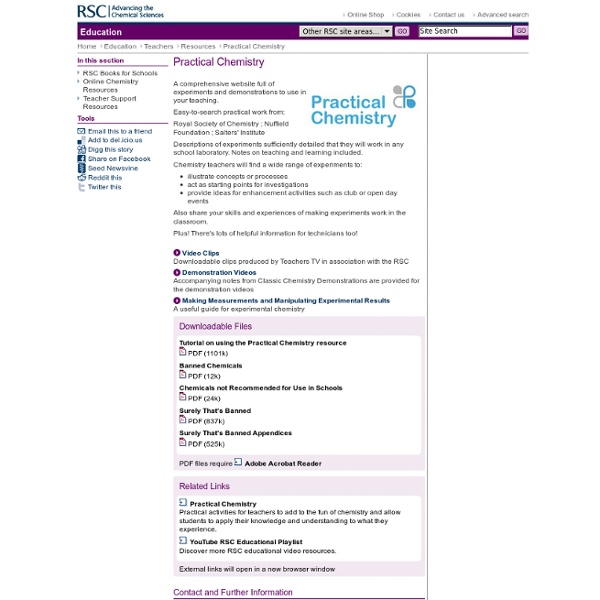



Chem Sheets.co.uk Practical Chemistry This website is for teachers of chemistry in schools and colleges. It is a collection of experiments that demonstrate a wide range of chemical concepts and processes. Some of the experiments can be used as starting-points for investigations or for enhancement activities. Chemistry is a practical science. We have published a new set of resources to support the teaching of practical science for Key Stages 3-5. CLEAPSS sci KNOCKHARDY PUBLISHING produces notes and other resources for AS and A2 Level Chemistry. The module references are for the AQA and OCR examinations but the material applies equally well to other specifications. The pages are saved as PDF files and may be freely read and printed for personal use but they may not be revised or circulated in any other form without the consent of Knockhardy Publishing. JONATHAN HOPTON Selected Pre-2008 specifications Last amended 23/08/2017 Mod 1 Mod 2 Mod 3 Mod 4 Mod 5 Module numbers refer to the latest OCR specification. These, and other, animated gifs are to be found inside my Powerpoint presentations. Complete topics summarised on one sheet Single page help sheets © 2001, 2008, 2015 Knockhardy Publishing and Jonathan Hopton FORMATION OF SODIUM CHLORIDE GCSE Chemistry resources: www.knockhardy.org.uk/gcse.htm F321 F322 F323 F324 F325 Unit numbers refer to the OCR specification. NOTES FOR 2015 SPECIFICATIONS ARE NOW AVAILABLE - see below Mod 6
Carbon cycle Atmosphere 750 billion tonnes of carbon Carbon in the atmosphere is mostly in the form of carbon dioxide with some methane and hydrofluorocarbons. The amount of carbon dioxide in the atmosphere is increasing. Acknowledgement: NASA. Vegetation 600 billion tonnes of carbon Plants store carbon as carbohydrates made from carbon dioxide from the atmosphere. Acknowledgement: Public domain. Soil and organic matter 1,600 billion tonnes of carbon Soil contains a lot of carbon in the form of dead plant material and in the many bacteria and other small organisms that live there. Coal, oil, gas 3,300 billion tonnes of carbon Carbon has been locked up in fossil fuels, built up from once-living things, for millions of years. Sediments and sedimentary rock 1,000,000,000 billion tonnes of carbon The carbon cycle overlaps the rock cycle. Acknowledgement: Bordalier institute. Ocean surface 1,000 billion tonnes of carbon Exchange of carbon dioxide between the ocean and the atmosphere takes place at the surface. Deep ocean
Royal Society of Chemistry, the largest organisation in Europe for advancing the chemical sciences TecHKnow News - www.techknow.org.uk Details Written by TecHKnow Published: 24 April 2014 The Course is ideal for staff using the Labexpert UK Chemical and Equipment stock control software or who would like to know more about Stock control systems. A Flyer and Application will be available from here shortly Published: 11 April 2014 The number of teachers and support staff working in England's state schools has risen to a record level of 1.3 million people. Read more here...... Published: 10 April 2014 Computer users across the globe are being strongly urged to change all their online passwords, including online banking, email and certain websites because of something called the Heartbleed Bug. This is a popular cryptographic library used to digitally scramble sensitive data as it passes to and from computer servers so that only the service provider and the intended recipients can make sense of it. No pet's names Hackers can find out a lot about you from social media Read more... Written by TecHKnowUK Published: 09 April 2014 In
Welcome to Norwich High School Molecule of the Month Welcome to the Molecule of the Month page! This is one of the longest running chemistry webpages on the internet. Each month since January 1996 a new molecule has been added to the list on this page, which makes this one of the longest running Chemical websites on the internet! The links will take you to a page at one of the Web sites at a University Chemistry Department or commercial site in the UK, the US, or anywhere in the world, where useful (and hopefully entertaining!) Each month's new molecule will be announced on Twitter [@MoleculeM] and via an RSS newsfeed [ We are always happy to receive Molecule of the Month articles from anyone who wishes to submit one. What do I need to see the pages properly? See here for all the details of software and helper files you require. See here for a list of the awards and citations received by this page and a disclaimer. Above is a drop-down alphabetical list of all the molecules.
Welcome | ScienceWeb - ASTA